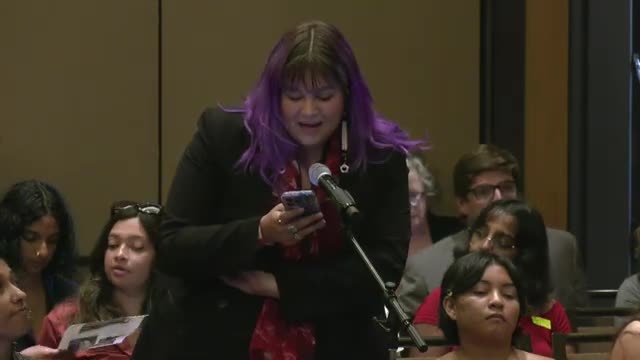Regents Face Concerns Over Layoffs And Tuition Model Impact On Low Income Students
July 13, 2025 | University of California, Boards and Commissions, Executive, California
This article was created by AI summarizing key points discussed. AI makes mistakes, so for full details and context, please refer to the video of the full meeting. Please report any errors so we can fix them. Report an error »

The University of California Board of Regents meeting on July 13, 2025, highlighted significant concerns regarding student welfare, budget cuts, and the impact of recent policy changes on marginalized communities.
A key point of discussion was the cohort tuition model, which was initially designed to support low-income students. However, speakers expressed concerns that the model has not delivered on its promises. A former board member emphasized the need for further data collection to assess the model's impact, noting that 10% of students earning under $60,000 do not receive grants, and many who do still struggle with tuition costs. This raises alarms about the financial burden on vulnerable groups, including homeless students and foster youth.
The meeting also addressed layoffs affecting various programs and staff across the UC system. Naomi Hammonds, president of the UCLA Graduate Student Association, voiced her worries about the layoffs of project directors for access and retention programs that serve first-generation and low-income students. She urged the board to uphold the university's commitment to equity and inclusion during these restructuring efforts.
Additionally, Catherine Cobb, president of Teamsters Local 2010, criticized budget cuts at UC San Diego's library, which have led to layoffs despite increased enrollment and state funding. She called for accountability from UC leadership, arguing that these cuts are unnecessary and detrimental to student services.
Concerns were also raised about the recent ban on student masking during protests, which some speakers argued infringes on First Amendment rights and could expose students to retaliation for their activism.
The meeting underscored the urgent need for the UC system to prioritize student voices and address the financial and structural challenges facing its diverse student body. As the board moves forward, the implications of these discussions will be crucial in shaping a more equitable and supportive educational environment.
A key point of discussion was the cohort tuition model, which was initially designed to support low-income students. However, speakers expressed concerns that the model has not delivered on its promises. A former board member emphasized the need for further data collection to assess the model's impact, noting that 10% of students earning under $60,000 do not receive grants, and many who do still struggle with tuition costs. This raises alarms about the financial burden on vulnerable groups, including homeless students and foster youth.
The meeting also addressed layoffs affecting various programs and staff across the UC system. Naomi Hammonds, president of the UCLA Graduate Student Association, voiced her worries about the layoffs of project directors for access and retention programs that serve first-generation and low-income students. She urged the board to uphold the university's commitment to equity and inclusion during these restructuring efforts.
Additionally, Catherine Cobb, president of Teamsters Local 2010, criticized budget cuts at UC San Diego's library, which have led to layoffs despite increased enrollment and state funding. She called for accountability from UC leadership, arguing that these cuts are unnecessary and detrimental to student services.
Concerns were also raised about the recent ban on student masking during protests, which some speakers argued infringes on First Amendment rights and could expose students to retaliation for their activism.
The meeting underscored the urgent need for the UC system to prioritize student voices and address the financial and structural challenges facing its diverse student body. As the board moves forward, the implications of these discussions will be crucial in shaping a more equitable and supportive educational environment.
View full meeting
This article is based on a recent meeting—watch the full video and explore the complete transcript for deeper insights into the discussion.
View full meeting
